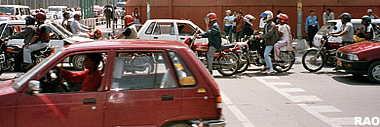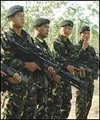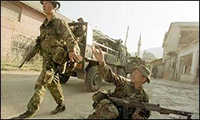|
British
Army - Brigade of Gurkhas |
 |
Nepal Information |
|
|
 |
|
Nepal:
Recruiting for the Gurkha regiment |
 |
|
The
British Gurkhas: British Gurkha Vetereans |
 |
February
2001
 |
| Demonstrations
by angry Gurkha veterans have become commonplace in the Nepali capital
Kathmandu. The Gurkhas argue that they have sacrificed their lives
for long enough but they do not get the same benefits as other British
soldiers. The British say these are trouble makers, encouraged by
the local communist party. With the cost of living an estimated £170
a year in Nepal, they argue, these men are amply rewarded. At the
lowest level, pensions have recently been doubled to £750 a year. |
|
But,
encouraged by the way British tabloid newspapers have taken up their cause,
the Gurkha veterans' organisation want more. Free education and guaranteed
jobs for their children, right of abode in the UK and pensions equal to
a British soldier.
|
Pension
dispute |
 |
 |
| Such
a pension would make a Gurkha veteran a hundred times wealthier than a
retired soldier in Britain. "That's not the point," says Lieutenant
Yam Bahadur Gurung. "The British owe a debt to the Gurkhas - an immense
debt which cannot be valued in pounds, let's put it like that," he says.
But the British army is sensitive to charges of exploitation. Asanta
Rai, the widow of the Gurkha sergeant killed recently in Kosovo, has received
a £54,000 death in service payment, equal to a British widow. |
|
It
makes her, in local terms, a millionairess. But, she explains, being a
Gurkha in Nepal carries certain obligations. "It's true that a British
Gurkha in Nepal earns a lot of money but then he is expected to support
his own family and the extended family besides," she says.
|
Pressure |
 |
Which
accounts for the pressure on young men to join. "I've wanted to join
since I was little, mainly for financial reasons because it is very difficult
to find a job in Nepal," says 18-year-old Mani Gurung. "That's why
I want to be a British Gurkha." There are no jobs in rural Nepal
and the only alternative for a young man here is subsistence farming.
It is noticeable that the houses belonging to Gurkha veterans in rural
Nepal are richer than their neighbours. Eight young men applied from
Mani's village and I asked his mother how important is was that her son
got in. "I will be devastated if he is not chosen," said Ril Suba
Gurung. "We are counting on him. I am just waiting for the news,"
she said. And the news came the next day. Mani has got in and is
on his way to the UK. "Now it's your turn," his mother says, to the
next oldest brother. Whatever the rows going on in Kathmandu, up
in the hills it is still every boy's dream to join the British army.
|




